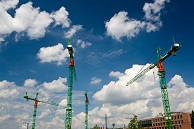While GST-registered construction companies largely make taxable supplies in the form of construction services, it is not uncommon to find secondary income streams recorded in their financial statements, such as:
- Interest income received from loans to local holding company/subsidiary/associate company
- Interest income received from finance lease of equipment to a local party
- Fees collected from supply of accommodation for worker's dormitory
The above income streams are regarded as non-Regulation 33 exempt supplies from the GST angle, and hence, input tax incurred to make such supplies might not be claimable and input tax incurred on common expenses might need to be apportioned. GST-registered construction companies should apply the De Minimis Rule as well as input tax apportionment (where necessary) to ensure their GST return(s) do not contain possible errors.
Can GST-registered construction companies claim all input tax incurred?
Generally, input tax incurred on expenses to facilitate making of exempt supplies cannot be claimed. To alleviate business costs, the Inland Revenue Authority of Singapore ("IRAS") has prescribed two scenarios where GST-registered construction companies making exempt supplies are allowed to claim all input tax incurred (including input tax attributable to the making of exempt supplies) at the end of any prescribed accounting period:
Scenario 1: The De Minimis Rule under Regulation 28 is satisfied
This is when the total value of all exempt supplies made does not exceed:
(a) An average of $40,000 a month; and
(b) 5% of the total value of all taxable and exempt supplies made in that period.
Scenario 2: Only Regulation 33 exempt supplies are made by a GST-registered construction company (and it must not be a Regulation 34 business1 )
Regulation 33 exempt supplies set out below are considered to be necessary to the making of taxable supplies, and hence, input tax incurred on expenses to facilitate making of such exempt supplies is treated attributable to the making of taxable supplies:
- Current or fixed deposit accounts placed with a local bank
- Exchange of currencies
- Factoring receivables
- Provision of loans to employees
In the event where a GST-registered construction company’s exempt supply situation falls within Scenarios 1 or 2, it may claim all input tax incurred, including those relating to the making of exempt supplies. However, input tax disallowed under Regulations 26 and 27 of the GST (General) Regulations (e.g. motor car expenses) remains not claimable.
Should the construction company’s exempt supply situation falls outside Scenarios 1 or 2, input tax incurred on expenses to make non-Regulation 33 exempt supplies is not claimable and those relating to common expenses (e.g. audit fees, tax fees, office rental) needs to be apportioned using a prescribed formula.
1These are businesses making predominantly exempt supplies such as banks, insurance company, financial companies, pawnbrokers and credit card companies, etc.
----------
WE SPECIALISE IN SERVING REAL ESTATE & CONSTRUCTION BUSINESSES

Each industry is unique and the hallmark of a great business partner is the ability to understand and identify the needs and goals of each business in its own context. Our vertical industry units are designed to help companies grow through tailored services with insightful, practical and effective advice.
Learn more about our Real Estate & Construction industry unit!


